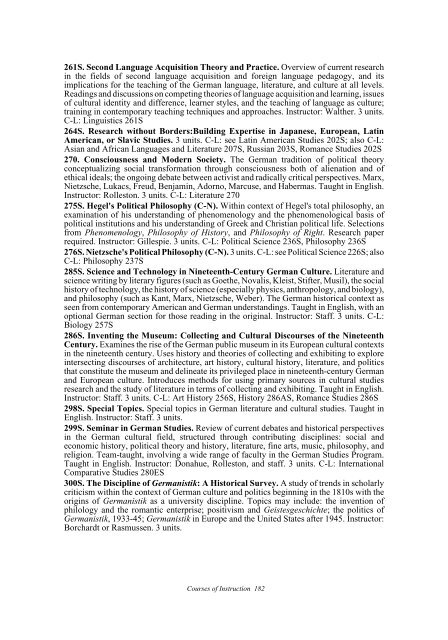Duke University 2008-2009 - Office of the Registrar - Duke University
Duke University 2008-2009 - Office of the Registrar - Duke University
Duke University 2008-2009 - Office of the Registrar - Duke University
You also want an ePaper? Increase the reach of your titles
YUMPU automatically turns print PDFs into web optimized ePapers that Google loves.
261S. Second Language Acquisition Theory and Practice. Overview <strong>of</strong> current research<br />
in <strong>the</strong> fields <strong>of</strong> second language acquisition and foreign language pedagogy, and its<br />
implications for <strong>the</strong> teaching <strong>of</strong> <strong>the</strong> German language, literature, and culture at all levels.<br />
Readings and discussions on competing <strong>the</strong>ories <strong>of</strong> language acquisition and learning, issues<br />
<strong>of</strong> cultural identity and difference, learner styles, and <strong>the</strong> teaching <strong>of</strong> language as culture;<br />
training in contemporary teaching techniques and approaches. Instructor: Wal<strong>the</strong>r. 3 units.<br />
C-L: Linguistics 261S<br />
264S. Research without Borders:Building Expertise in Japanese, European, Latin<br />
American, or Slavic Studies. 3 units. C-L: see Latin American Studies 202S; also C-L:<br />
Asian and African Languages and Literature 207S, Russian 203S, Romance Studies 202S<br />
270. Consciousness and Modern Society. The German tradition <strong>of</strong> political <strong>the</strong>ory<br />
conceptualizing social transformation through consciousness both <strong>of</strong> alienation and <strong>of</strong><br />
ethical ideals; <strong>the</strong> ongoing debate between activist and radically critical perspectives. Marx,<br />
Nietzsche, Lukacs, Freud, Benjamin, Adorno, Marcuse, and Habermas. Taught in English.<br />
Instructor: Rolleston. 3 units. C-L: Literature 270<br />
275S. Hegel's Political Philosophy (C-N). Within context <strong>of</strong> Hegel's total philosophy, an<br />
examination <strong>of</strong> his understanding <strong>of</strong> phenomenology and <strong>the</strong> phenomenological basis <strong>of</strong><br />
political institutions and his understanding <strong>of</strong> Greek and Christian political life. Selections<br />
from Phenomenology, Philosophy <strong>of</strong> History, and Philosophy <strong>of</strong> Right. Research paper<br />
required. Instructor: Gillespie. 3 units. C-L: Political Science 236S, Philosophy 236S<br />
276S. Nietzsche's Political Philosophy (C-N). 3 units. C-L: see Political Science 226S; also<br />
C-L: Philosophy 237S<br />
285S. Science and Technology in Nineteenth-Century German Culture. Literature and<br />
science writing by literary figures (such as Goe<strong>the</strong>, Novalis, Kleist, Stifter, Musil), <strong>the</strong> social<br />
history <strong>of</strong> technology, <strong>the</strong> history <strong>of</strong> science (especially physics, anthropology, and biology),<br />
and philosophy (such as Kant, Marx, Nietzsche, Weber). The German historical context as<br />
seen from contemporary American and German understandings. Taught in English, with an<br />
optional German section for those reading in <strong>the</strong> original. Instructor: Staff. 3 units. C-L:<br />
Biology 257S<br />
286S. Inventing <strong>the</strong> Museum: Collecting and Cultural Discourses <strong>of</strong> <strong>the</strong> Nineteenth<br />
Century. Examines <strong>the</strong> rise <strong>of</strong> <strong>the</strong> German public museum in its European cultural contexts<br />
in <strong>the</strong> nineteenth century. Uses history and <strong>the</strong>ories <strong>of</strong> collecting and exhibiting to explore<br />
intersecting discourses <strong>of</strong> architecture, art history, cultural history, literature, and politics<br />
that constitute <strong>the</strong> museum and delineate its privileged place in nineteenth-century German<br />
and European culture. Introduces methods for using primary sources in cultural studies<br />
research and <strong>the</strong> study <strong>of</strong> literature in terms <strong>of</strong> collecting and exhibiting. Taught in English.<br />
Instructor: Staff. 3 units. C-L: Art History 256S, History 286AS, Romance Studies 286S<br />
298S. Special Topics. Special topics in German literature and cultural studies. Taught in<br />
English. Instructor: Staff. 3 units.<br />
299S. Seminar in German Studies. Review <strong>of</strong> current debates and historical perspectives<br />
in <strong>the</strong> German cultural field, structured through contributing disciplines: social and<br />
economic history, political <strong>the</strong>ory and history, literature, fine arts, music, philosophy, and<br />
religion. Team-taught, involving a wide range <strong>of</strong> faculty in <strong>the</strong> German Studies Program.<br />
Taught in English. Instructor: Donahue, Rolleston, and staff. 3 units. C-L: International<br />
Comparative Studies 280ES<br />
300S. The Discipline <strong>of</strong> Germanistik: A Historical Survey. A study <strong>of</strong> trends in scholarly<br />
criticism within <strong>the</strong> context <strong>of</strong> German culture and politics beginning in <strong>the</strong> 1810s with <strong>the</strong><br />
origins <strong>of</strong> Germanistik as a university discipline. Topics may include: <strong>the</strong> invention <strong>of</strong><br />
philology and <strong>the</strong> romantic enterprise; positivism and Geistesgeschichte; <strong>the</strong> politics <strong>of</strong><br />
Germanistik, 1933-45; Germanistik in Europe and <strong>the</strong> United States after 1945. Instructor:<br />
Borchardt or Rasmussen. 3 units.<br />
Courses <strong>of</strong> Instruction 182









